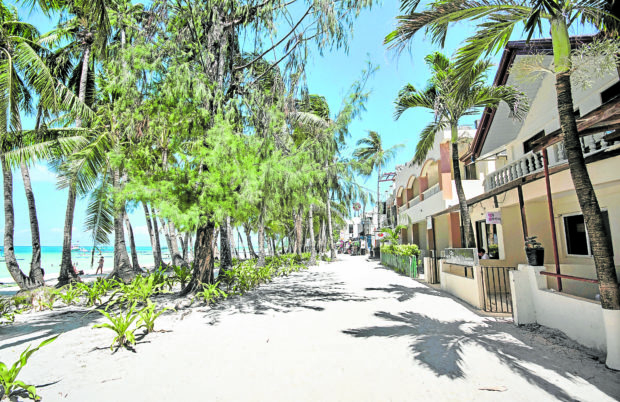Forestland clearing in Boracay continues

ISLAND CONFLICT As tourism starts picking up on Boracay Island after months of lockdown due to the pandemic, several business owners and longtime residents are facing eviction from areas that the government has classified as forest and public lands. —JACK JARILLA
Several longtime residents of Boracay, among them expatriates, are scrambling to leave their homes and properties, spooked by last week’s arrest of 10 people for allegedly occupying forestland areas in the resort island.
“Many families are leaving their homes here, just weeks before Christmas, on the threat of arrest and not being able to post a P36,000 bail,” an expatriate said. The bail is for those facing criminal complaints for violation of the Revised Forestry Code.
Concerned individuals separately spoke or sent messages to the Inquirer on condition that their names be withheld over concerns that they would be singled out.
DENR notices
Last week, the National Bureau of Investigation arrested six Filipinos, a Belgian, a Filipino Australian, and two Britons for allegedly occupying or building properties in areas categorized as forestland. Under the law, these areas cannot be used without special permission from the government, or until these are recategorized as “alienable and disposable.”
The respondents, who were able to post bail after being detained for two days, were sued for occupying supposed no-build zones in areas being cleared of illegal structures as part of the rehabilitation of the resort island.
Article continues after this advertisementMore arrests are expected as several residents and property owners have been sent notices by the Department of Environment and Natural Resources (DENR) to vacate or dismantle their properties.
Article continues after this advertisement“Those they arrested have lived in their homes for more than 20 years. They had all the papers and permits since the late 1990s, paid fees and taxes. Suddenly, they are ‘illegal,’” one resident said.
Another said their family had been paying tax declarations since the 1940s for their land categorized as agricultural. “We are being driven away from land that our ancestors have been occupying,” the resident said.
Leonae Isabyl Graf, a resident, said many houses now considered illegal by the government “were built in good faith.”
Commercial dev’t
“These people are not ‘greedy business owners’ but local and foreign investors who fell in love with the lifestyle in Boracay,” she said.
Residents and property owners have questioned the classification of areas as forestland, citing commercial development and residential structures in these areas. They also pointed out that they were given building permits and that they had been paying local government fees and taxes for decades.
“I have been paying real property every year since the early 2000s. Why is the government accepting my tax for all these years if my property is illegal? Do I get a refund? I just want to spend retirement in peace with everyone,” the expatriate said.
Presidential Proclamation No. 1064, issued on May 22, 2006, by then President Gloria Macapagal-Arroyo, categorized 628.96 hectares, or 60.94 percent of the island, as alienable and disposable, and the rest as forestland and protected areas.
Most of the areas categorized as public land are now occupied and built up with residential and commercial structures.
The Supreme Court, in a ruling on Oct. 8, 2008, upheld Proclamation No. 1064 declaring the entire island a property of the state, except those with titles.
“Even if its forest cover has been replaced by beach resorts, restaurants and other commercial establishments, it has not been automatically converted from public forest to alienable agricultural land,” it said. INQ